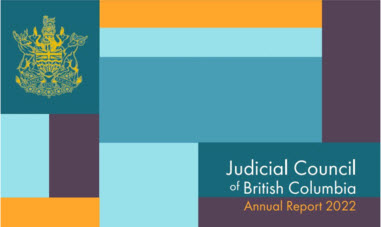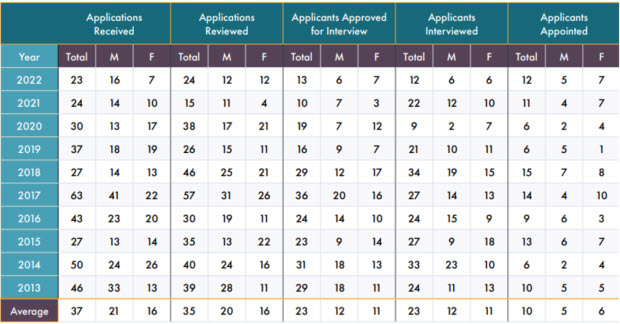Every year BC’s Judicial Council reports to the public on its work assessing candidates who apply to be appointed a judge or judicial justice in the BC Provincial Court. Its annual reports share demographic information about candidates including age, gender, years and type of legal experience, and ethnic or cultural backgrounds volunteered by the lawyers who apply. As a result, the Council has been recognized as a trail-blazer in transparency.
This eNews shares insights from the Council’s 2022 annual report.
How are Provincial Court judges and judicial justices appointed?

Under Canada’s Constitution Acts, the federal government appoints judges to the BC Supreme Court, the BC Court of Appeal, and the Supreme Court of Canada. However, the provincial government (technically, the province’s Lieutenant Governor in Council, meaning the Lieutenant Governor acting on the advice of the provincial Cabinet) appoints judges and other judicial officers to the BC Provincial Court.
It’s the job of the BC Judicial Council to screen candidates for appointment and recommend those who are qualified to the provincial Attorney General. Cabinet then appoints judges and judicial justices to the BC Provincial Court from the list of recommended candidates.
A lawyer seeking appointment to the Provincial Court completes a detailed online application. The Judicial Council then carefully examines their professional standing, reputation, abilities, temperament, and other relevant factors. It interviews the ones who meet defined criteria before deciding whether to recommend them. This approval process is intended to ensure that only the most exceptional applicants, who are unquestionably capable of meeting the demands of judicial service, are recommended for appointment.
Applications in 2022
In 2022, the Council received 23 applications for appointment as a Provincial Court judge. It reviewed 24 applications (including some received in 2021), interviewed 12 applicants, and recommended eight. The government appointed 12 judges in 2022, including some recommended in previous years. The Council also received four applications for appointment as a judicial justice, interviewed four applicants, and one was appointed.
At 23, the number of lawyers applying to be a Provincial Court judge in 2022 was the lowest in the last decade. The ten year average was 37, and 2017 saw a high of 63.

The BC Judicial Council encourages all qualified lawyers to consider applying for full-time appointment as a judge or for part time adjudication work as a judicial justice. Both are rewarding careers providing an opportunity to serve the public in a crucial role, with collegial colleagues, intellectual stimulation, and work that is never boring! A part-time appointment as a judicial justice can be combined with parenting responsibilities, semi-retirement or legal work other than criminal law practice.
Applicants’ gender
In 2022 the total number of lawyers applying to be a judge was down but the number of men who applied was up. The number of male applicants (16) increased from the previous year but remained below the 10-year average of 21. The number of female applicants (7) was less than half the ten-year average of 16 and less than half the number of male applicants.
In 2022, seven women and five men were appointed as judges. Over the past five years, 27 women and 23 men have been appointed to the Provincial Court bench. As of March 31, 2022, 52.7% of the full-time judges in the Court were women.
Diversity
The Council encourages applications from candidates of diverse backgrounds. In 2022, six of the 23 applications included information pertaining to these diversity factors: Indigenous, Ethnic/Visible Minority, and Diverse Group.
Other demographics
On average, female applicants in 2022 were slightly older and more experienced than male. The average age of applicants in 2022 was 50 years for men and 51 years for women, while the ten-year average was 53 years for men and 51 years for women.
However, 2022’s applicants had practised law for an average of 23 years, a year more than the ten-year average. In 2022, female applicants averaged one more year of legal experience than men.
Applicants’ legal experience varies. In 2022, 43% came from private practice, 39% from Crown counsel, and 17% from other areas.
What else you’ll find in the report
The colourful report includes photographs (you might notice a nautical theme), profiles of Council members, tables showing ten-year trends, and information on Council’s other responsibilities: judicial education, judicial ethics, vetting justice of the peace applicants, and dealing with complaints about judicial officers.
More information
Judicial Council’s 2022 Annual Report
More information on BC Judicial Council
Criteria and competencies for appointment as a Provincial Court Judge

